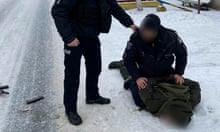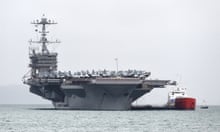The Guardian’s world affairs editor assesses the outcome of three rounds of talks this week about the fate of Ukraine, involving Russia, the US, Nato and the Organization for Security and Co-operation in Europe (OSCE).
Did the talks achieve anything?
Not much. The Russians have described them as a “dead end”. The gap between what the US and its allies were prepared to talk about – reciprocal limits on missiles and military exercises and other confidence-building measures – and what Moscow was demanding – guarantees that Ukraine and other former Soviet bloc states would never join Nato – is as wide at the end of the week as it was at the beginning. But at least the possibility of finding common ground has been tested, and diplomacy is being given a chance.
Is there any more clarity about what Russia wants?
Yes. It is clear now that Russia was not using its troop build-up and its demands about Nato as a bluff to achieve gains on other matters. The three meetings this week have provided opportunities for Russia to take an off-ramp and find a face-saving solution, but Moscow has not taken them. There is little doubt any more that Vladimir Putin is seeking nothing less than a transformation in European security, with a much-reduced Nato presence along its borders.
Are there likely to be more talks?
Russian officials on Thursday did not make it sound like there was much appetite in Moscow for further discussions. The Poles suggested having an intensified dialogue on security issues within the framework of the OSCE, but the Russians have said all along they want a quick resolution, rather than an ongoing process of airing grievances. Ukraine has suggested a summit to address the crisis, this time with Kyiv at the table, but there has been no response from Moscow.
What happens next?
The diplomats go back to their capitals to discuss the next steps. All eyes will be on Moscow and the movements of Russian troops and armour in the region around Ukraine. The Russian foreign minister, Sergei Lavrov, is due to give a press conference on Friday. That should give a clearer idea of Putin’s state of mind. The Russians have demanded the US give written comments on the draft agreements that Moscow published in December, which include the proposed limits on Nato. It is not clear yet whether Washington will submit those written responses summing up its objections.
Has the chance of war increased or decreased after the talks?
Increased. The probability that Putin was using the pressure on Ukraine as leverage to get something else was always small. Now it has all but disappeared. It is also clearer that the US and its allies are not ready to offer a fudge on Ukraine’s Nato membership, acknowledging that it is unlikely for the foreseeable future. After this week, we know that Putin is ready to go to the very brink of war. The question now is: will he go over it?









